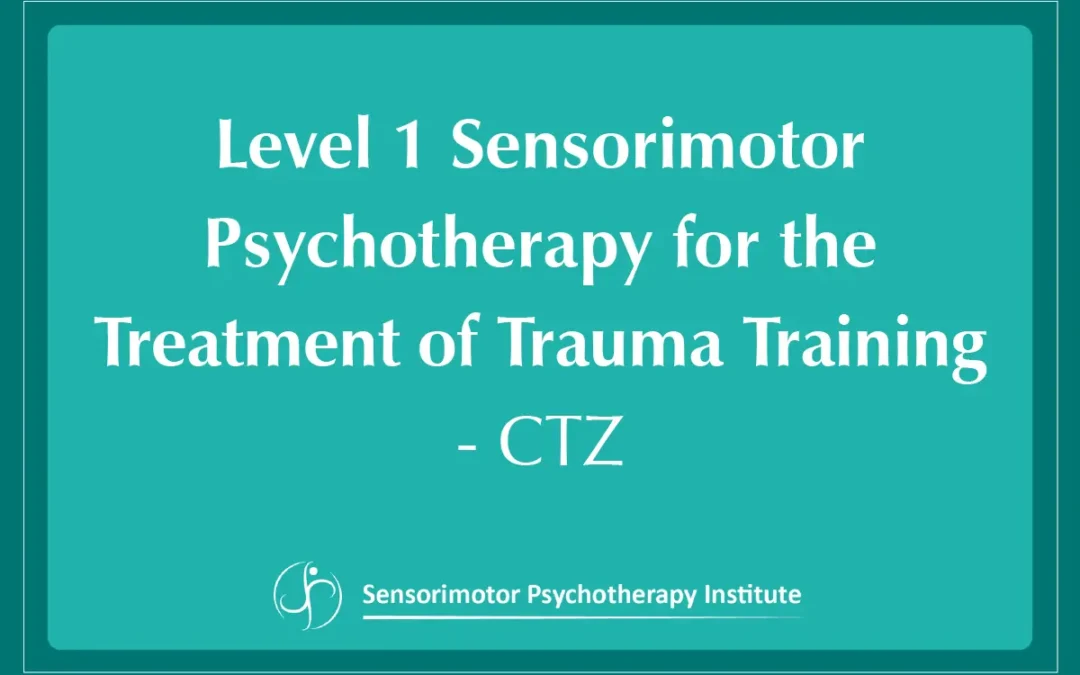The latest updates to our calendar of educational trainings have been published, including the much-requested Level 1 introductory program exploring the applications and benefits of Sensorimotor Psychotherapy in trauma treatment – register now to secure your spot.
We are delighted to welcome Raymond Rodriguez, a well-known and experienced Licensed Clinical Social Worker specializing in therapies for clients with complex psychological trauma and PTSD, as our lead trainer for the duration of the CTZ program.
This is a superb opportunity to learn from a highly respected professional with a wealth of real-world expertise, with up to 39 CE Credits available.
Designed for clinicians, practitioners, and professionals across the disciplines, including counselors and therapists keen to expand their knowledge of somatic movement as a therapeutic modality, we also welcome graduate and post-graduate students to join our Level 1 program.
All participants will benefit from insights into how Sensorimotor Psychotherapy may help overcome the limitations of more conventional talk therapies and trauma interventions.
Focus and Learning Outcomes of Level 1 Sensorimotor Psychotherapy for the Treatment of Trauma Training
Starting on December 5, 2024, our newest CTZ Level 1 training will introduce Sensorimotor Psychotherapy at an attainable level, ideal for participants either new to the modality or without any previous formal learning.
Working through a series of self-study, live, and interactive group sessions, attendees can discuss their understanding, share thoughts and experiences in their respective practices, and see how Sensorimotor Psychotherapy works, both firsthand and as observers to illustrate its relevance in trauma treatment.
We strive to be as accessible and inclusive as possible, offering hybrid in-person and hybrid online training formats as well as in-person, live online, and independent study.
Over the weeks, Level 1 participants will learn about body-oriented interventions, the nature and types of somatic activations that exist, and why exploring, naming, and understanding physical trauma responses can help mental health professionals support clients looking to restore their sense of self.
By the end of the training, participants will be equipped with the skills and understanding to apply basic Sensorimotor Psychotherapy techniques within their own practices or to help clients for whom other traditional therapies have been less successful.
Many opt to schedule more advanced training with us, although a Level 1 program covers the foundational skills and involves learning about how those capabilities can be adapted to enable mental health professionals and trauma-focused clinicians to assist in more complex clinical circumstances.
CE Credits and Verified CPD Hours Available Following Our Level 1 Training
After completion of the training, with the closing session on June 26, 2025, attendees may be eligible for up to 39 CE Credits, alongside up to 78 hours of evidenced Continuing Professional Development (CPD).
Other attendees will be provided with a Certificate of Attendance to confirm that they have completed the full Level 1 training.
Benefits of Studying Sensorimotor Psychotherapy as an Introduction To Body-Oriented Somatic Interventions
Sensorimotor Psychotherapy as a modality is complex and yet enables clinicians, practitioners, and counselors to introduce simplified interventions and phased treatments to effectively name, track, and address behavioral patterns and somatic activations related to trauma or traumatic experiences.
Starting with our Further, more advanced programs are available should you wish progress onwards after completion of our Level 1 training.
As the first step on the pathway to becoming a skilled, experienced Sensorimotor Psychotherapy practitioner, Level 1 trainings include live and interactive sessions with our accomplished trainers, group-based discussion and thought sharing, and real-world experiences of Sensorimotor Psychotherapy in action, giving you a solid comprehension to build upon.
Practitioners can also use a Level 1 program to improve their general knowledge and look at ways to expand on conventional talk therapies or decide to engage in further, higher-level trainings hosted by the Sensorimotor Psychotherapy Institute to look at more involved, specific interventions, earning CE credits and logging Continued Professional Development (CPD) along the way.
One of the standout advantages of attending the Level 1 Sensorimotor Psychotherapy for the Treatment of Trauma training is that the learning can be implemented immediately.
The option of more advanced study or attending our varied webinars, seminars, and workshops enables you to focus on certain aspects of the modality you’d like to explore in greater depth.
Registering for the CTZ Level 1 Sensorimotor Psychotherapy for the Treatment of Trauma Program
Applicants are encouraged to register early. An early registration discount is available for a limited time, and capacity is capped to ensure all participants gain the most from the training, particularly the group and live interactive sessions.
Full details of training timings, the dates of the live modules, and eligibility requirements for enrolment are available through our booking pages, but attendees must be able to attend the initial orientation session and closing session, each lasting 2.5 hours.
More information about Sensorimotor Psychotherapy, the Institute’s work, and our other diverse workshops, webinars, training programs, and certifications is available online. This includes insights into the work, accolades, and expertise of our lead trainer, Raymond Rodriguez.
If the Level 1 CTZ training dates for the Sensorimotor Psychotherapy for the Treatment of Trauma do not align with your existing commitments, we recommend browsing the Upcoming Sensorimotor Psychotherapy Trainings database to find the next programs within your time zone.
I’m not sure if this is the best way to rephrase this, but wanted to ensure there was no confusion they must begin with Level I. Please change if you find something that sounds better.


Recent Comments